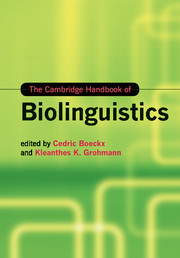Book contents
- The Cambridge Handbook of Biolinguistics
- The Cambridge Handbook of Biolinguistics
- Copyright page
- Dedication
- Contents
- Figures
- Tables
- Contributors
- Acknowledgements
- 1 Introducing the volume
- 2 Biolinguistics: A historical perspective
- 3 Biolinguistics yesterday, today, and tomorrow
- 4 The philosophical foundations of biolinguistics
- Part I Language development
- Part II Mind, brain, behavior
- Part III Language evolution
- 21 The cognitive capacities of non-human primates
- 22 Birdsong for biolinguistics
- 23 Language, culture, and computation:
- 24 Language and natural selection
- 25 The fossils of language: What are they? Who has them? How did they evolve?
- Notes
- References
- Index
22 - Birdsong for biolinguistics
from Part III - Language evolution
Published online by Cambridge University Press: 05 May 2013
- The Cambridge Handbook of Biolinguistics
- The Cambridge Handbook of Biolinguistics
- Copyright page
- Dedication
- Contents
- Figures
- Tables
- Contributors
- Acknowledgements
- 1 Introducing the volume
- 2 Biolinguistics: A historical perspective
- 3 Biolinguistics yesterday, today, and tomorrow
- 4 The philosophical foundations of biolinguistics
- Part I Language development
- Part II Mind, brain, behavior
- Part III Language evolution
- 21 The cognitive capacities of non-human primates
- 22 Birdsong for biolinguistics
- 23 Language, culture, and computation:
- 24 Language and natural selection
- 25 The fossils of language: What are they? Who has them? How did they evolve?
- Notes
- References
- Index
Summary
Keywords
- Type
- Chapter
- Information
- The Cambridge Handbook of Biolinguistics , pp. 431 - 459Publisher: Cambridge University PressPrint publication year: 2013

